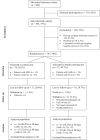Effect of Digital Health Coaching on Self-Efficacy and Patient-Reported Outcomes in Individuals with Acute Myeloid and Chronic Lymphocytic Leukemia: A Pilot Randomized Controlled Trial
- PMID: 38861934
- PMCID: PMC11632142
- DOI: 10.1159/000539756
Effect of Digital Health Coaching on Self-Efficacy and Patient-Reported Outcomes in Individuals with Acute Myeloid and Chronic Lymphocytic Leukemia: A Pilot Randomized Controlled Trial
Abstract
Introduction: Promotion of self-efficacy can enhance engagement with health care and treatment adherence in patients with cancer. We report the outcomes of a pilot trial of a digital health coach intervention in patients with leukemia with the aim of improving self-efficacy.
Methods: Adult patients with newly diagnosed acute myeloid leukemia (AML) and chronic lymphocytic leukemia (CLL) were randomized 1:1 to a digital health coach intervention or standard of care. The primary outcome of self-efficacy was measured by the Cancer Behavior Inventory (CBI) score.
Results: A total of 147 patients (37 AML, 110 CLL) were enrolled from July 2020 to December 2022. In the AML cohort, there was a mean increase in CBI score of 7.03 in the digital health coaching arm compared to a mean decrease of -3.57 in the control arm at 30 days (p = 0.219). There were no significant associations between the intervention and other patient-reported outcomes for patients with CLL.
Conclusion: There were numerical, but not statistically significant increases in self-efficacy metrics in AML patients who received digital health coaching. Although this trial was underpowered due to enrollment limitations during a pandemic, digital health coaching may provide benefit to patients with hematologic malignancy and warrants further investigation.
Introduction: Promotion of self-efficacy can enhance engagement with health care and treatment adherence in patients with cancer. We report the outcomes of a pilot trial of a digital health coach intervention in patients with leukemia with the aim of improving self-efficacy.
Methods: Adult patients with newly diagnosed acute myeloid leukemia (AML) and chronic lymphocytic leukemia (CLL) were randomized 1:1 to a digital health coach intervention or standard of care. The primary outcome of self-efficacy was measured by the Cancer Behavior Inventory (CBI) score.
Results: A total of 147 patients (37 AML, 110 CLL) were enrolled from July 2020 to December 2022. In the AML cohort, there was a mean increase in CBI score of 7.03 in the digital health coaching arm compared to a mean decrease of -3.57 in the control arm at 30 days (p = 0.219). There were no significant associations between the intervention and other patient-reported outcomes for patients with CLL.
Conclusion: There were numerical, but not statistically significant increases in self-efficacy metrics in AML patients who received digital health coaching. Although this trial was underpowered due to enrollment limitations during a pandemic, digital health coaching may provide benefit to patients with hematologic malignancy and warrants further investigation.
Keywords: Acute myeloid leukemia; Chronic lymphocytic leukemia; Clinical trial; Digital health coach; Self-efficacy.
© 2024 S. Karger AG, Basel.
Conflict of interest statement
C.D. is supported by the LLS Scholar in Clinical Research Award, receives research support (to the institution), and serves as a consultant (personal fees) for AbbVie. K.B. and A.B. are employed by Pack Health, A Quest Diagnostics Company, which provided the intervention for this study. All other authors have no disclosures or potential COIs to report. This study was presented in part as a poster at the ASCO Quality Care Symposium in 2023.
Figures



Similar articles
-
Cost of Disease Progression in Patients with Chronic Lymphocytic Leukemia, Acute Myeloid Leukemia, and Non-Hodgkin's Lymphoma.Oncologist. 2019 Sep;24(9):1219-1228. doi: 10.1634/theoncologist.2018-0019. Epub 2019 Feb 26. Oncologist. 2019. PMID: 30808814 Free PMC article.
-
Engagement, Acceptability, and Effectiveness of the Self-Care and Coach-Supported Versions of the Vira Digital Behavior Change Platform Among Young Adults at Risk for Depression and Obesity: Pilot Randomized Controlled Trial.JMIR Ment Health. 2024 Sep 19;11:e51366. doi: 10.2196/51366. JMIR Ment Health. 2024. PMID: 39298763 Free PMC article. Clinical Trial.
-
The burden and outcomes associated with four leukemias: AML, ALL, CLL and CML.Expert Rev Anticancer Ther. 2003 Jun;3(3):311-29. doi: 10.1586/14737140.3.3.311. Expert Rev Anticancer Ther. 2003. PMID: 12820775 Review.
-
Does Working with a Health Coach Help Patients with COPD Improve Their Quality of Life and Breathe Easier? [Internet].Washington (DC): Patient-Centered Outcomes Research Institute (PCORI); 2019 Sep. Washington (DC): Patient-Centered Outcomes Research Institute (PCORI); 2019 Sep. PMID: 38620370 Free Books & Documents. Review.
-
Expressive writing to address distress in hospitalized adults with acute myeloid leukemia: a pilot randomized clinical trial.J Psychosoc Oncol. 2024;42(5):587-603. doi: 10.1080/07347332.2023.2296619. Epub 2023 Dec 22. J Psychosoc Oncol. 2024. PMID: 38133149 Clinical Trial.
References
-
- Kantarjian HM, Kadia TM, DiNardo CD, Welch MA, Ravandi F. Acute myeloid leukemia: treatment and research outlook for 2021 and the MD Anderson approach. Cancer. 2021;127(8):1186–207. - PubMed
-
- Shadman M. Diagnosis and treatment of chronic lymphocytic leukemia: a review. JAMA. 2023;329(11):918–32. - PubMed
-
- Burger JA. Integrating new therapies for chronic lymphocytic leukemia. Cancer J. 2021;27(4):275–85. - PubMed
-
- Portenoy RK. Cancer-related fatigue: an immense problem. Oncologist. 2000;5(5):350–2. - PubMed
-
- Passik SD, Dugan W, McDonald MV, Rosenfeld B, Theobald DE, Edgerton S. Oncologists’ recognition of depression in their patients with cancer. J Clin Oncol. 1998;16(4):1594–600. - PubMed
Publication types
MeSH terms
Grants and funding
LinkOut - more resources
Full Text Sources
Medical

